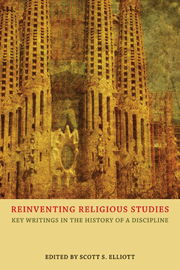Book contents
- Frontmatter
- Contents
- Introduction
- 1 For such a time as this: the Council of Societies for the Study of Religion, 1969–2009
- Part I Inventing and reinventing the field of religious studies
- Part II Method and theory in religious studies
- Part III Teaching religion
- Part IV Women and the bible in religious studies
- Part V Religion and religious studies in civic life
- Part VI Religious studies and identity politics
- Part VII Islam and 9/11
- 37 On the teaching of Islam in America
- 38 Reflections on teaching about September 11
- 39 Death and memory at Ground Zero: a historian of religion's report
- 40 September 11, 2001 and Islam
- Bibliography
- Acknowledgments
- Index
37 - On the teaching of Islam in America
from Part VII - Islam and 9/11
- Frontmatter
- Contents
- Introduction
- 1 For such a time as this: the Council of Societies for the Study of Religion, 1969–2009
- Part I Inventing and reinventing the field of religious studies
- Part II Method and theory in religious studies
- Part III Teaching religion
- Part IV Women and the bible in religious studies
- Part V Religion and religious studies in civic life
- Part VI Religious studies and identity politics
- Part VII Islam and 9/11
- 37 On the teaching of Islam in America
- 38 Reflections on teaching about September 11
- 39 Death and memory at Ground Zero: a historian of religion's report
- 40 September 11, 2001 and Islam
- Bibliography
- Acknowledgments
- Index
Summary
Those who want to advance the study and teaching of Islam as religion are in a dilemma. On the one hand, Islamic studies is seldom represented sufficiently on faculties of religion; on the other hand, departments of Near Eastern studies seldom investigate the religious character of Islam adequately. This dilemma does not characterize the study of Primitive, Far Eastern, Indian, and other religious traditions in quite the same way. In general, the study of non-Western traditions has had a renaissance in religious studies. Scholars of Far Eastern, Indian, and African civilizations are turning increasingly to the study of religion and conversely, with respect to these areas, religion faculties are making significant contributions to area studies programs. The study of the religion of Islam has not been so enthusiastically cultivated by departments of religion or of Near Eastern studies. I should like to reflect on this dilemma with the hope that any discussion created thereby might serve to clarify the need to establish better means of training scholars in the religion of Islam. Departments that seek to answer this need will be providing a greater service to their students and to other disciplines concerned with the study of Islam.
1
Positions in Islamic religious studies are seldom filled by graduates of religion departments. Scholars who teach the religion of Islam come from departments of Near Eastern studies, with critical training in languages and history sufficient to provide the necessary competence for working with original sources. Graduates of these programs rarely acquire a complementary background in the history and phenomenology of religion.
- Type
- Chapter
- Information
- Reinventing Religious StudiesKey Writings in the History of a Discipline, pp. 228 - 231Publisher: Acumen PublishingPrint publication year: 2013



